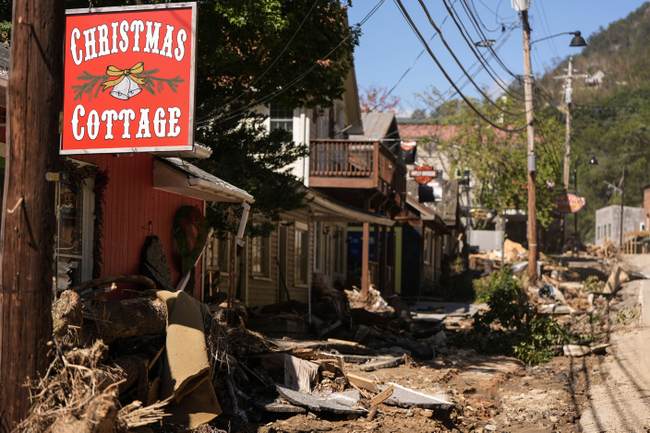We support our Publishers and Content Creators. You can view this story on their website by CLICKING HERE.

The last couple of weeks have been a whirlwind of emotions, whether you’re excited about our new president and the new direction for our country or… shaving your head and swearing off “the patriarchy.” While I fall into the first category, I still need a break from politics from time to time, so I thought I’d share a sweet story of determination and dedication that happened in the immediate days after Hurricane Helene swept through the Southeast — a palate cleanser to start your week off right.
Advertisement
Helene hit Western North Carolina hard back in September, including the historic Biltmore Estate. The popular tourist destination is home to 54 horses, and a group of four employees volunteered to spend the night with the horses when the storm made landfall, not knowing exactly what they were up against. Director of Equestrian Activities Elizabeth McLean also spent the night on the 8,000-acre property, but she was away from the equestrian facilities.
Once the storm was over, McLean feared the worst and was determined to make it to the Biltmore Equestrian Center to check on her staff and the horses, but there were dozens of trees down across the roads. It was so bad that it took her a few days to make it across the property. Meanwhile, the staff members — Cassie Hague, Caroline Wright, Cierra Guerrigues, Mango Lukenda, and Annie Crandell, according to Southern Living — watched as the French Broad River kept rising. Suddenly, an overnight precautionary stay turned into having to figure out how to keep themselves and the horses alive for several days with no help from or contact with the outside world and no electricity and running water.
Their biggest concern was finding clean water for horses that can drink up to 10 gallons per day. On the first day, they were able to rely on rainwater that had gathered in troughs, but after that, the team began hauling buckets of fresh water from a nearby creek. In between trips, they watched the rising water levels to ensure the flooding didn’t trap the horses in the barn and stopped occasionally to see if they could get in touch with their families without much luck, USA Today reports. They also had no idea how badly the storm had devastated the region around them.
Advertisement
Eventually, McLean made it to the barn where the staff spent four days working around the clock to ensure the horses were safe, healthy, watered, and well-fed. While those days were tough on the team, Wright called it a “miniature example” of what was going on all around them. “Community happens, and you just take care of each other,” she said.
I love stories like this because it shows that there are still good people in the world. Western North Carolina is home to even more good people, but they’re still struggling nearly two months after Helene hit. Small businesses in the area, particularly those in the hospitality industry, and their employees are having an especially rough time. Fall is peak tourist season in the mountains, which means it’s often the most lucrative time of year for businesses in these small towns and cities.
WRAL in Raleigh reports that many restaurants and hotels in the area still have to boil water and may need to for a few more weeks. But that doesn’t mean businesses aren’t open. The Biltmore Estate re-opened its doors last week, and several other smaller tourist attractions are following. Many hotels and restaurants are open, too, even if they have to provide guests with bottled water and use plastic utensils and paper plates.
So how can you help? Go visit. “Get out there and spend your money and help Western North Carolina recover,” Gov. Roy Cooper said earlier this month. Stay in the hotels. Eat at the restaurants. Visit the attractions. While you may not get to see the colorful fall leaves this year, the mountain towns of North Carolina are a great place to spend a cozy holiday, shop for unique handmade Christmas gifts, and view some of the most beautiful scenery in the country. Consider it traveling for a good cause.
Advertisement

 Conservative
Conservative  Search
Search Trending
Trending Current News
Current News 







